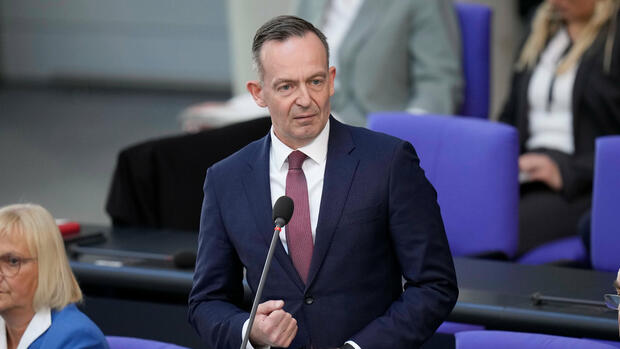The transport minister recently announced that the climate targets in the transport sector would be easy to meet.
(Photo: IMAGO/Political Moments)
Berlin Just a few days ago, Transport Minister Volker Wissing (FDP) defended his climate protection policy on the “Maischberger” talk show. “The legal situation is absolutely clear,” explained Wissing when asked how he intends to meet the climate targets in the transport sector.
Since too many greenhouse gases were produced on roads, rails, waterways and in the air in 2022, he had three months to propose countermeasures. If the law has not been changed by the end of this period, “then it will not be difficult for me to present an immediate program”. Even better: At the end of March, the coalition committee decided on “a series of measures” to save carbon dioxide. “Every single one of these measures exceeds what we have to save in terms of CO2,” claimed Wissing.
The Climate Protection Act stipulates that every minister must meet certain climate targets for his area – every year anew. In 2030, only 86 million tons of CO2 may be produced in traffic; In 2022 it was 148 million. Anyone who misses the targets must quickly explain how they intend to meet them next year. The deadline for the transport minister ends in mid-July.
Because Wissing missed its target in 2022, nine million tons were too many in the transport sector. Nine million tons that the minister wants to save with just one measure? Ask the ministry: How many emissions can be saved with each of the more than 50 measures that the coalition partners listed in their decision paper at the end of March?
Wissing’s press office does not go into this and rather replies: “Calculations on the effect of reducing CO2 emissions are the subject of ongoing internal government coordination on the measures to be taken.” The minister does not even know which of the measures that have been decided will help the climate – and if so: how much ?
Wissing is planning 13 measures for more climate protection – but with what effect?
His spokesman refers to 13 measures. This includes the expansion of cycle paths, local transport, rail routes, charging stations or solar systems along traffic routes. They also include subsidies for the purchase of new vehicles or the development of synthetic fuels (e-fuels) and a CO2 surcharge on the truck toll from 2024. The ministry has failed to calculate the effect of each individual measure – as well as to point out that a number of of the measures can only make a contribution to climate protection in many years.
>>Read here, what problems the transport minister has with the freight railways.
The Handelsblatt had already asked for the climate protection list for the transport sector in spring 2022. Expert opinions are available from the ministry, but the house did not want to give any details. Then in the summer, Wissing had to publish at least some of the forecast effects: the transport sector had 2021 produces a good three million tons too much CO2, the minister had to present his first emergency program. The proposals should ensure 13 million tons less CO2 in traffic – albeit added up to the year 2030. In no single year would the plans have saved the over-produced three million tons.
The double truck toll is said to have a strong climate impact.
(Photo: dpa)
If Wissing now wants to save nine million tons, the difference will be even greater, even if there are apparently no figures yet. Only one measure seems to work particularly well, at least based on the loud resistance of the transport industry: higher transport prices in the form of a double truck toll. From 2024, it is to rise to 200 euros per ton of carbon dioxide emitted, thus helping to avoid ten million tons of CO2 – at least cumulatively up to 2030 and if there are enough trucks with climate-neutral drives by then.
Hope lies in fewer trips to work thanks to the home office
The ministry’s experts have justified hopes due to a consequence of the corona pandemic: Many more people will continue to work from home in the future. The experts see a potential of four million tons, added up from 2023 to 2030. However, the amount could also be “significantly higher and also be increased through suitable instrumentation,” they write. There is talk of up to eight million tons by 2030. That would be as much as all the measures planned so far for urban space would bring in together, such as more local transport (1.7 million tons), more footpaths and cycle paths (four million) and other measures.
This also includes the promotion of efficient truck trailers, but the experts only see a potential of at most one million tons by 2030. They do not even attribute an additional climate impact to the plan to set up charging stations: this is contained in other instruments, such as the CO2 standards for cars, the promotion of new commercial vehicles or CO2 pricing.
In view of the many small savings effects, it becomes clear how tedious and lengthy the road to climate-neutral mobility is. For Minister Wissing, this is the reason for wanting to change the Climate Protection Act and no longer having to meticulously track the climate targets year after year: Many things that mean change in the transport sector take many years. His statement that he can achieve the goals immediately with every single measure is all the more astonishing.
More: The three illusions of German transport policy.
